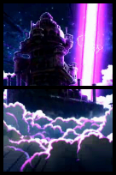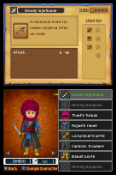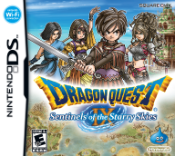
When I sat down to play Dragon Quest IX, I just about knew what to expect. At least, I thought I knew what to expect. See, I've played Dragon Quest, Dragon Quest IV, and Dragon Quest V, and as both fans and those familiar with the franchise understand, the mainline Dragon Quest titles have many, many similarities and traditions. While there have been eight games in the series up until now, very few changes have been made to the formula.

Now then, please have a seat, take in a deep breath, and brace yourself: Dragon Quest IX has several new ideas and types of new content. No, really. To begin with, every character in the party is fully customizable. His or her gear, body shape, size, hair color, eye shape, hair style, and eye color has a noticeable impact on how each individual character appears. Likewise, so long as the desired class has been unlocked, it's possible to completely customize the class of any character, his or her weapon(s) of choice, and ultimately his or her purpose, strengths, and weaknesses.
Likewise, where character customization has been expanded, so has the post-game content. In what's become typical Dragon Quest fare, there are extra stories, dungeons, and bosses available after the main storyline is completed. Many of the 180+ quests unlock after the initial story is over, with the rest unlocking after a weekly connection to the Nintendo WFC. Unlike prior Dragon Quest titles, though, there's a virtually infinite number of dungeons and more than ten new bosses, some of which can even level up to level 99, providing a gradual challenge curve for each boss.

Unfortunately, all of the variability comes at a cost: Unlike many prior titles, the character and story development are borderline non-existent and very impersonal, respectively. While non-combat partners join your party in a sense, this substitution pales in comparison to, say, Dragon Quest V's character and story development. In addition, all party chat features, where players can hear commentary from story-related party members, have been removed. The story progresses piece-by-piece, like most Japanese-style RPGs: The characters help a town or individual gain self-confidence and overcome adversity. At certain intervals, the overall plot progresses, and while the story isn't terrible as far as Dragon Quest and RPG stories go, it certainly isn't very compelling, either, especially with the party's lack of personality.
Since characters are much more versatile than even the prior game, the battle system feels slightly more advanced. As I said before, any character can invest skill points into any ability, and further, abilities cross over to any class. Even more, there's a potentially unlimited amount of skill points, so a player who likes to have every advantage possible can invest the hours and hours of time, if he or she desires.

Enemies and bosses, as always, feel a bit basic. In battle, any individual enemy can potentially have abilities very similar to the ones the party's characters can have, and all-in-all, everything is straight-forward. Fights consist of buffs, debuffs, damage-dealing attacks and spells, and other abilities. There's nothing particularly complex, but at lower levels, some boss fights, especially those in the post-game, can be challenging or nearly impossible due to the sheer amount of damage bosses can deal.
Like the skill point system, Alchemy also makes a return from Dragon Quest VIII. Players can combine items and make very useful gear and medicine far earlier than similar equipment could be bought, provided they know the recipe for the desired items. Also returning? Incredibly low item drop rates. The rarest items have a 1/256 chance of dropping, though they're considerably easier to steal from enemies, since every party member can gain the steal ability.

Dragon Quest IX is the first title in the series to bring in any multiplayer aspects, which are, unfortunately, more of a mixed bag than one might first assume. To begin with, a few items are unlocked by "tagging" several other players, something along the lines of thirty, or so. While I question the ability for many individuals to be able to find thirty unique players, the tagging process itself is slow and cumbersome. There's a limit of three tags for each time players go canvassing for tags. What's that mean? That means each time a player has tagged three people, he or she has to exit the tag mode, leave the building, re-enter, talk through the tag mode introduction, pick out the map he or she wishes to share, and then save the game again. It's not too lengthy a process, but in the attendance of a Dragon Quest IX special event with more than, say, six other people in attendance, it does grow annoying.
The main part of multiplayer works nearly flawlessly. Players are independent of each other, though the host's party is reduced for each visitor, and can explore any part of the host's world currently available to the host. Should the host need a hand, he or she can summon visitors to him or her immediately at no cost. In battles, experience is using the same, normal, in-game methods. Item drops seem to be given to everyone involved in the battle, as well, so there's no reason to fear losing valuables from boss fights.
All-in-all, Dragon Quest IX is a very similar game to many prior Dragon Quest games. The post-game appears to be vastly expanded beyond the previous titles, and the addition of multiplayer adds a nice touch, though the lack of WiFi multiplayer makes the feature less accessible than most would like, and is surprising, given the online capabilities of Final Fantasy: Crystal Chronicles: Echoes of Time, an earlier Square-Enix game with Nintendo WFC-based real-time combat supporting four players. As in other titles, puns abound in town and enemy names, and provides a bit of much-needed whimsy to the story. For story-related reasons, it's debatable whether or not Dragon Quest IX could be considered the best Dragon Quest yet, but from what I've both played and seen, its gameplay content could be second-to-none.















Comments